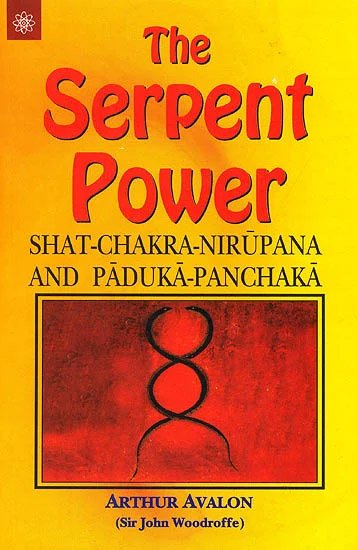Shat-cakra-nirupana (the six bodily centres)
by Arthur Avalon | 1919 | 46,735 words | ISBN-10: 8178223783 | ISBN-13: 9788178223780
This is the English translation of the Shat-cakra-nirupana, or “description of the six centres”, representing an ancient book on yoga written in the 16th century by Purnananda from Bengal. This book investigates the six bodily centres famously known as Chakras. The text however actually forms the sixth chapter of the Shri-tattva-cintamani, compiled...
Verse 45
Sanskrit text, Unicode transliteration, Word-for-word and English translation of verse 45:
इदं स्थानं ज्ञात्व नियतनिजचित्तो नरवरो
न भूयात् संसारे पुनरपि न बद्धस्त्रिभुवने ।
समग्रा शक्तिः स्यान्निय ममनसस्तस्य कृतिनः
सदा कर्तुं हर्तुं खगतिरपि वाणि सुविमला ॥ ४५ ॥idaṃ sthānaṃ jñātva niyatanijacitto naravaro
na bhūyāt saṃsāre punarapi na baddhastribhuvane |
samagrā śaktiḥ syānniya mamanasastasya kṛtinaḥ
sadā kartuṃ hartuṃ khagatirapi vāṇi suvimalā || 45 ||That most excellent of men who has controlled his mind[1] and Inown this place is never again born in the Wandering,[2] as there is nothing in the three worlds which binds him. His mind being controlled and his aim achieved, he possesses complete power to do all which he wishes, and to prevent that which is contrary to his will. He ever moves towards the Brahman.[3] His speech, whether in prose or verse, is ever pure and sweet.
Commentary by Śrī-Kālīcaraṇa:
In this verse he speaks of the fruit of a complete knowledge of the Sahasrāra. The idea sought to be conveyed is that a knowledge of this place should be gained as a whole and in detail.
“Who has controlled his mind” (Niyata-nija-citta)—i.e., he who has controlled and concentrated the inner faculties on this place. Such an one becomes free from Saṃsāra, or, in other words, he is released from bondage, as there is nothing to bind or attract him in these worlds. By "bondage is meant the Māyik bonds of virtue (Puṇya) and sin (Pāpa).
The Bhāgavata says: “If the action which is the product of the operation of the Guṇas is attributed to the self, then such (false) attribution is bondage and Saṃsāra and servitude.” Also cf. Bhagavad-Gītā: “O Son of Kuntī, Man is bound by action which is the product of his own nature (Sva-bhāva).”[4]
To inhabit this body for the purpose of undergoing Pāpa (sin) and Puṇya (virtue) is bondage. In heaven one enjoys (the fruit of) Puṇya, and in the nether world (Pātāla) one suffers sorrow, and on earth man is subject to both Pāpa and Puṇya. For the Tattva-jnānī (him who knows the truth) there is neither Puṇya nor Pāpa, which are the causes of “bondage; his accumulated (Saṃcita) Karma of merit (Puṇya) and demerit (Pāpa) is also destroyed. He is in consequence under no bondage whether in heaven (Svarga), earth (Martya), or nether world (Pātāla), and he is not truly embodied.[5] Such a one stays on earth so long only as he has not worked out what he has begun. He is liberated though living (Jīvanmukta), and attains complete Liberation on the dissolution of the body.
The Kulārṇava-Tantra says: “Those who have the Brahman in the heart can acquire neither merit by performing a hundred horse sacrifices, nor demerit by killing a hundred Brāhmaṇas.” The Gītā (III, 18) also says: “For him there is nothing in this world that should or should not be done. For such an one there is no dependence on any being.”[6]
The Subodhinī[7] interprets this verse to mean that the “knower” (Tattvajñānī) acquires no merit by the performance of actions nor demerit by the omission thereof.
Śruti[8] speaks of the destruction of accumulated (Saṃcita) Puṇya and Pāpa: “When Manas, which is now selecting and now rejecting, is dissolved in That; when Pāpa and Puṇya are destroyed (lit., burnt), Sadāśiva, who is Śakti and Ātmā (of. Haṃsaḥ, ante), is Śānta.”[9] Cf. Bhagavad-Gītā: “And so the fire of knowledge destroys all actions.”[10]
“Complete power” (Samagrā-śaktī)—power which enables him to do everything. By power, or Śakti, is meant ability to do all he desires, to do[11] and counteract all harm, to fly across the air,[12] and to become possessed of great powers of speech and of poetic composition.
Footnotes and references:
[1]:
Citta.
[2]:
Saṃsāra, the world of birth and rebirth to which men are impelled by their Karma.
[3]:
The interpretation of Viśvanātha is here adopted, according to which Kha=Brahman. As the term also means the “air” or “ether,” the text is capable of translation as “He is able to roam the sky”.
[4]:
Ch. XVIII, v. 60.
[6]:
Telang’s Translation: “He has no interest at all in what is done, and none whatever in what is not done, in this world; nor is any interest of his dependent on any being” (p. 54, Sacred Books of the East, Vol. VIII).
[7]:
That is, Śrīdhara-svāmī’s Commentary on the Gītā.
[8]:
[9]:
That is, peace and quietude like the still surface of an ocean characteristic of the Supreme State.
[10]:
IV, 37.
[11]:
Such an one may have such a power but will not wrongly exercise it.
